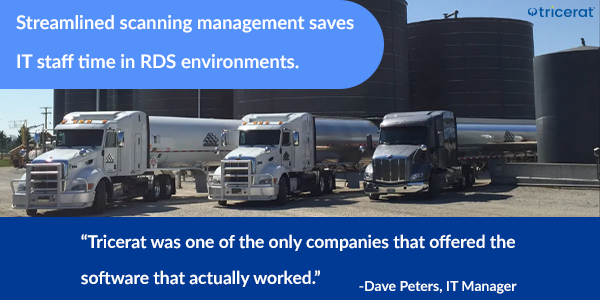For decades, many offices have turned to digitizing their paper documents and workflows to streamline processes. Scanners continue to play a huge part in today's push toward remote and hybrid work, as well. So what happens when scanners are incompatible with remote IT infrastructure?
Many companies today implement remote desktop services and virtual desktops for increased flexibility, security, and cost savings. The problem? Scanners often don’t natively function within remote desktop session hosts, leading to scanner redirection issues, driver incompatibility, and limited support for scanning through remote desktop.
Below are three ways to achieve seamless remote desktop scanning, whether using USB scanner redirection RDP, network scanning, or third-party solutions.
Getting the scanner through to the target remote desktop environment is the first step when working on redirection. Regardless of your remote environment (Azure, Citrix, VMware, etc.), it is often the case that USB scanners are not readable from the remote session.
Third-party solutions have moved in to fill this gap in out-of-the-box virtual technology (for example, Windows 2008 terminal servers do not even support scanner redirection).
The best ones work by querying the scanner, virtualizing that as a data source, and redirecting it into the terminal server. These specialized third party apps eliminate scanner/terminal server incompatibility without any extra effort on the IT admin's part.
Learn more about Tricerat's solution for scanning.
The next hurdle to get through when scanning via remote desktop is driver issues. TWAIN and WIA drivers are the most common and are tricky to navigate in virtual environments.
Universal scanner drivers remove scanner driver incompatibility issues, solving for things like "failed to initialize scanner" errors, among many others. A good virtual universal driver can query the local scanners for capabilities (such as resolution and supported paper sizes) and then forward that information into the remote session, application, or desktop.
As long as a scanner can properly function, third party software can easily remove driver management from the list of things a sys admin has to worry about.
Traditionally, scanner drivers are installed on and connected to the local computer in one of two ways:
Most third-party software requires TWAIN or WIA drivers to be installed and fully functioning properly using the manufacturer's software. A third-party software solution should support RDP, ICA, and PCoIP protocols.
If USB scanner redirection RDP is not an option, network scanning provides an alternative for scan to remote desktop functionality. This approach is ideal for offices using terminal server scanner redirection or scanner redirection for VMware Horizon.
Tip: Some environments require you to disable scanner redirection for VMware Horizon to avoid conflicts between USB and network scanning methods.
Because USB and network scanning is not typically supported out of the box in remote desktops, admins sometimes have to resort to complicated workarounds to support scanning for their users. This can lead to undue burden on system resources.

In addition to removing the need for complex workarounds, third party scanning software can also streamline the underlying scanning process. A good third party scanning solution will compress data being transferred across the network, leading to reduced bandwidth consumption (while still preserving image fidelity).
The best solution to USB and network scanning in remote desktop environments is to find a high-quality third-party software that checks all the boxes:
✅ Compatibility: Supports TWAIN scanner remote desktop setups.
✅ Ease of Use: Minimal setup required for redirect scanner functionality.
✅ Performance: Works efficiently across different remote desktop services.
✅ Security: Ensures all transmission and redirection is secure and reliable.
There are plenty on the market to chose from, since scanning is a high priority business need but not usually supported in virtual environments. A good scanning solution will help with redirecting scanners into the terminal server, eliminate scanner driver management, and optimize network resources.
To learn more about Tricerat's scanning solution, ScrewDrivers®, schedule a demo today.